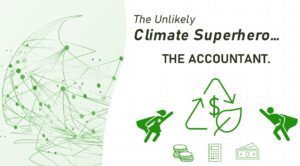THE ACCOUNTANT
Engineering and technology leaders have the greatest claim to saving our planet and providing a low-cost clean and 100% renewable energy future. Theodore Wright was an aerospace engineer. His law of cost reduction with the accumulated doubling of production delivers engineering innovations that continue to break down cost barriers for wind, solar, battery and EV technologies.
The environmental science and social policy folks have consistently raised the alarm of climate change and environmental degradation to a fevered pitch – Silent Spring, Cadillac Desert, Desert Solitaire, etc. For the brave corporate professionals trying to establish goals and move forward with Environmental, Social, and Governance (ESG) reporting to address the triple bottom line (people, profit, planet), picking a protocol, knowing your audience, and following a standard can feel overwhelming. Because ESG applies a holistic approach to business efficiency, overcoming bureaucratic inertia, the status-quo, and superficial greenwashing requires a cultural shift – and that’s hard.

Enter the Accountant, our pocket protector hero. Watching the sustainability movement from the cheap seats over the last thirty years, the Accountant heads down to the sidelines. Accountants are no strangers to reporting and disclosure.
For centuries, accounting has served as the “language of business.” Like any language, it has evolved—along with the world around it—to meet the needs of its users.
Over time, languages gain new words, inflections, and even grammatical constructions, while others fall into disuse. Against the backdrop of today’s changing business landscape, practitioners in sustainability, finance, operations, and investing must understand how to identify, quantify, and communicate the sustainability factors that are material to a company’s financial condition and operating performance.
Prior to the Great Depression in 1914, the US Supreme Court justice Louis Brandeis articulated the benefit of disclosure:
Publicity is justly commended as a remedy for social and industrial diseases. Sunlight is said to be the best of disinfectants; electric light the most efficient policeman.
In other words, public exposure and transparency are the key to monitoring the companies and investors that collectively shape capital markets. Brandeis’s thinking significantly influenced the regulatory reform that followed, including the establishment of the US Securities and Exchange Commission (US SEC) in 1934. The mission of the US SEC is to protect investors; maintain fair, orderly, and efficient markets; and facilitate capital formation. Disclosure was at the heart of regulatory reform in the 1930s, building on previous sentiments of the benefit of transparency. Today, the SEC is stepping in once again to protect investors and influence corporate behavior. Public disclosure requires reporting expertise and that requires accounting and risk professionals.
A consensus of ESG financial reporting requirements is being finalized by the International Accounting Standards Board (IASB) and US based Financial Accounting Standards Board (FASB). These standards will go a long way toward creating transparency and accountability for all stakeholders.
Here’s how THG Energy Solutions can support ESG accounting: We organize your energy, utility, and facility data in one centralized, easily accessible location.
THG has spent nearly twenty years building processes and procedures (accountant-approved and endorsed, of course) around energy and utility data management best practices. We’ve developed extensive knowledge and real-world experience around the standards and reporting requirements. One by-product of a good reporting system is that it can illuminate energy efficiency and demand management opportunities that often justify and underwrite ESG reporting costs with money left over. We have seen a significant uptick in ESG engagements this year with our industry partners and clients. For most clients, this represents a first-time effort to organize, measure, and manage the multi-faceted emissions reporting requirements. These new reporting standards will require new focus, along with dedication and commitment.
Even if you’re just starting to explore options, we’d welcome an opportunity to collaborate and discuss your efforts, sustainability goals, and answer questions around how to get started. Reach out by either leaving a comment, or emailing us – contactus@thgenergy.com
